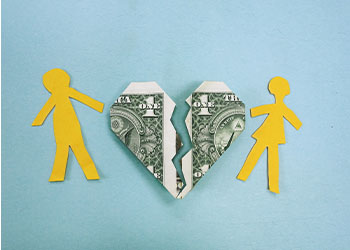What You Need to Know About Bankruptcy and Divorce
Feb. 29, 2024
 Dealing with issues such as bankruptcy and divorce is no easy feat, especially when they impact each other.
Dealing with issues such as bankruptcy and divorce is no easy feat, especially when they impact each other.
At the Kenneth H.J. Henjum Law Office, we're aware of the emotional toll and financial stress these circumstances can bring. We believe understanding is power, so we aim to give you the knowledge you need to make informed decisions. It's our goal to empower you as you navigate these challenging life events.
Understanding Bankruptcy
Bankruptcy is a legal procedure that allows individuals or businesses struggling with debt to seek relief and potentially start fresh. Bankruptcy isn't an easy decision, and it comes with its own set of challenges and consequences. However, it can also provide much-needed relief for those drowning in unmanageable debt.
There are different types of bankruptcies, each with its own set of rules and procedures. For instance, Chapter 7 bankruptcy involves the liquidation of assets to pay off debts, while Chapter 13 allows for debt restructuring. It's crucial to understand these differences and how they can impact your financial future.
Understanding Divorce
Divorce is another life event that can prove to be emotionally and financially challenging. At our law office, we've seen firsthand the myriad of issues that can arise during divorce proceedings. From child custody and alimony to property division, every case is unique and requires careful attention.
Like bankruptcy, divorce has its own set of legal procedures. There are different types of divorces as well — uncontested, contested, simplified, and default — each with its own requirements and potential outcomes. Navigating this process can be tough, but we're here to help make it less daunting.
The Intersection of Bankruptcy and Divorce
Bankruptcy and divorce often intersect, creating a more complicated situation. We've noticed that financial stress can sometimes lead to marital strain, which could result in divorce. Conversely, sometimes the financial implications of a divorce can lead to bankruptcy.
When dealing with bankruptcy and divorce simultaneously, it's essential to understand how one affects the other. The filing time for bankruptcy and divorce can significantly impact the outcome of both processes.
Impacts of Bankruptcy on Divorce Proceedings
Filing for bankruptcy can have significant implications on divorce proceedings. Notably, it can:
Halt the division of assets: When a bankruptcy case is filed, an automatic stay goes into effect, which stops most collection efforts, including the division of assets in a divorce.
Impact alimony and child support: While bankruptcy may discharge some debts, it doesn't affect domestic support obligations such as alimony or child support. These remain a priority regardless of a bankruptcy filing.
Delay divorce settlements: While the bankruptcy court handles the financial issues, the divorce may be put on hold, especially if the division of debts is contested.
Affect property settlements: Depending on the type of bankruptcy filed, some property awarded during a divorce settlement may later be used to pay creditors.
Determine debt responsibility: Bankruptcy might discharge joint unsecured debts, potentially altering agreements made during the divorce regarding who is responsible for paying which debts.
Understanding the timing and strategic considerations of when to file for bankruptcy in relation to divorce is crucial to protect your interests. It's important to consult with a lawyer who is experienced in both family law and bankruptcy law to understand how one will impact the other in your unique situation.
Impacts of Divorce on Bankruptcy Proceedings
Divorce can significantly influence the course of bankruptcy proceedings, affecting both the process and the discharge of debts. The financial changes brought on by a divorce can shape the nature of bankruptcy in several ways:
Alter Income Levels: Divorce often results in a change in household income. This could shift someone's eligibility from Chapter 7 to Chapter 13 bankruptcy, or vice versa, as these are largely income-based determinations.
Debt and Asset Reassessment: The division of matrimonial assets might necessitate a reassessment of the debtor's financial state. This could impact the exemptions a debtor is eligible for in bankruptcy.
Joint Debt Consideration: The divorcing parties might have joint debts that need to be factored into the bankruptcy. Discharging these debts may require careful legal planning to ensure that one party is not left with an unfair financial burden.
Understanding your financial standing post-divorce is vital when filing for bankruptcy. This includes reassessing your debt-to-income ratio, understanding the new scope of your liabilities, and recognizing how the division of assets and debts during your divorce will impact your bankruptcy filing.
Consulting with a legal professional who specializes in both areas is critical for navigating the intricacies of bankruptcy law as it intersects with the dissolution of marriage.
Get Experienced Legal Support
Dealing with bankruptcy and divorce simultaneously can be challenging, but you don't have to go through it alone. At the Kenneth H.J. Henjum Law Office, we're committed to guiding clients in Ventura, California, and the surrounding areas through these difficult times. We're here to provide the legal advice and support you need, so reach out today for support.
